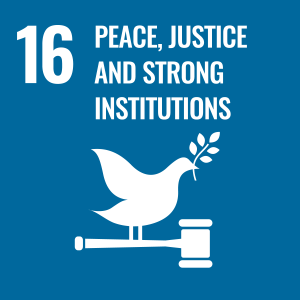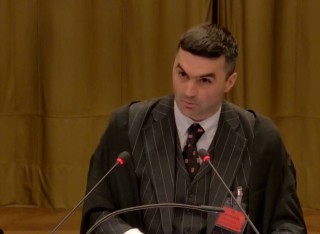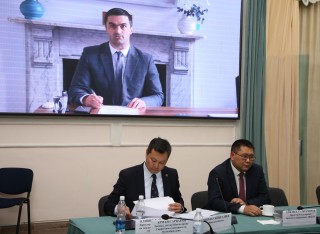
Dr Arman Sarvarian
About
Biography
Dr Sarvarian is a public international law generalist of broad interests and expertise. Appointed Lecturer in 2012, he was promoted Senior Lecturer in 2016 and Reader in 2020. His scholarship has been published in leading journals, including the European Journal of International Law, The Law and Practice of International Courts and Tribunals, ICSID Review and the International & Comparative Law Quarterly.
He regularly advises and acts as counsel to States and investors on a wide range of international law matters, such as the enforceability of provisional measures, the law of occupation and succession to treaties. He has acted as counsel to claimants, respondents and non-disputing parties in commercial and investor-State arbitration, including pending proceedings in the ICSID and PCA. In 2024, he was lead counsel for the Republic of Côte d'Ivoire in the Obligations of States in respect of Climate Change advisory proceedings at the International Court of Justice. Since 2019, he has served as legal adviser to the Republic of Armenia at the Legal Committee of the General Assembly, Working Group III (Investor-State Dispute Settlement Reform) of the UN Commission on International Trade Law and the Rules and Regulations Amendment Process of the International Centre for the Settlement of Investment Disputes (2019-2021). In those capacities, he has worked on a wide range of projects, such as the annual reports of the International Law Commission and International Court of Justice, the 2022 ICSID Arbitration Rules and the 2023 ICSID/UNCITRAL Code of Conduct for Arbitrators. He also served as judge ad hoc at the Grand Chamber of the European Court of Human Rights in 2020.
His first monograph Professional Ethics at the International Bar (Oxford University Press, International Courts and Tribunals Series, 19 September 2013) is the first comprehensive work on the subject and has been widely cited, including in proceedings before the International Court of Justice, International Tribunal for the Law of the Sea and investment arbitration. He was also lead editor of an edited volume (Procedural Fairness in International Courts and Tribunals) published by the British Institute of International and Comparative Law in November 2015. His second monograph entitled The Law of State Succession: Principles and Practice will be published by Oxford University Press in March 2025 as a comprehensive treatment of the field as a comprehensive, practical, and empirical overview of the topic, establishing State succession as a distinct field with a cohesive set of rules.
He served as Co-Rapporteur of the International Law Association Committee on the Procedure of International Courts and Tribunals from 2016 to 2020, which resulted in a Final Report and Resolution containing proposals for reform to the rules of procedure and working practices of the International Court of Justice, International Tribunal for the Law of the Sea, Permanent Court of Arbitration and WTO Dispute Settlement System. Proposals for procedural reform made by the Committee have been adopted by those institutions. He was a member of the International Bar Association Task Force on Counsel Ethics in International Arbitration throughout the drafting of the IBA Guidelines on Party Representation in International Arbitration 2013, which inspired the London Court of International Arbitration to enact the first binding ethical rules for counsel in international commercial arbitration in 2014.
Areas of specialism
University roles and responsibilities
- Director of Internationalisation
My qualifications
Previous roles
Affiliations and memberships
News
In the media
ResearchResearch interests
Dr Sarvarian’s research interests are in general international law, focusing upon the codification of fundamental rules and the progressive development of international dispute settlement machinery. As a generalist of public international law, his research engages with a variety of topics, such as the international responsibility, international personality, the use of force, international criminal law, sources of international law and the law of territory. He has worked extensively on the procedural law of international courts and tribunals and the law of State succession. He is currently engaged on a research project investigating the implementation of the 2015 Paris Agreement at the national and international levels, including in international investment law and human rights law.
From 2016 to 2020, he served as Co-Rapporteur of the International Law Association Committee on the Procedure of International Courts and Tribunals. The Final Report and Resolution of the Committee were adopted by the International Law Association at its seventy-ninth biennial conference in December 2019. He previously served as a member of the International Law Association Committee on the Use of Force and the International Bar Association Task Force on Counsel Ethics in International Arbitration.
Research projects
Dr Sarvarian is Co-Rapporteur of the ILA Committee on the Procedure of International Courts and Tribunals, which has a four-year mandate to investigate potential reforms to the rules of procedure and working practices of the International Court of Justice, International Tribunal for the Law of the Sea, Permanent Court of Arbitration and World Trade Organization Dispute Settlement Body. Building upon his earlier work on the procedural law of international courts and tribunals, this collaborative project is aimed at the realisation of practical outcomes. The Committee will present its interim report in August 2018 and its final report in August 2020.
Research collaborations
Ratification of the Rome Statute by the Republic of Armenia (2013-2015)
Dr Sarvarian was principal organiser of a high-level conference in collaboration with the American University of Armenia, Coalition for the International Criminal Court and International Commitee for the Red Cross entitled 'Ratification of the Rome Statute by the Republic of Armenia: Problems and Prospects' held in 2013. The question of ratification and the legal and political issues entailed therein were explored in detail and the event was widely covered by the Armenian media. He was subsequently retained to advise the ad hoc Commission on Constitutional Reform, which recommended amendment to the Constitution of the Republic of Armenia to enable ratification of the ICC Statute. In collaboration with the ICC and the Coalition for the ICC and with the support of the UK Embassy to Armenia, he organised a training workshop on the law and procedure of the International Criminal Court for members of the Chamber of Advocates of the Republic of Armenia; one of the participants subsequently became the first Armenian national to be admitted to the ICC List of Defence Counsel. In 2015, he was invited to address the ICC Assembly of States Parties on the Armenia-ICC relations. In November 2017, Armenia concluded a Comprehensive and Enhanced Partnership Agreement with the European Union, which envisages the eventual accession of Armenia to the ICC Statute.
Arts and Humanities Research Council, Principal Investigator, 'Apologies for Historical Wrongs: When, How, Why?', Research Project (October 2014 - September 2015), https://gtr.ukri.org/projects?ref=AH%2FM006239%2F1.
Indicators of esteem
Member of the AHRC Peer Review College (2015-2021)
Peer reviewer for the Leiden Journal of International Law, Italian Year Book of International Law, Journal of International Dispute Settlement, Journal of World Investment and Trade, ICSID Review, German Year Book of International Law, International & Comparative Law Quarterly, European Journal of International Law, Journal on the Use of Force and International Law, Oxford University Press, Cambridge University Press, Routledge, Hart Publishing and Manchester University Press
Research interests
Dr Sarvarian’s research interests are in general international law, focusing upon the codification of fundamental rules and the progressive development of international dispute settlement machinery. As a generalist of public international law, his research engages with a variety of topics, such as the international responsibility, international personality, the use of force, international criminal law, sources of international law and the law of territory. He has worked extensively on the procedural law of international courts and tribunals and the law of State succession. He is currently engaged on a research project investigating the implementation of the 2015 Paris Agreement at the national and international levels, including in international investment law and human rights law.
From 2016 to 2020, he served as Co-Rapporteur of the International Law Association Committee on the Procedure of International Courts and Tribunals. The Final Report and Resolution of the Committee were adopted by the International Law Association at its seventy-ninth biennial conference in December 2019. He previously served as a member of the International Law Association Committee on the Use of Force and the International Bar Association Task Force on Counsel Ethics in International Arbitration.
Research projects
Dr Sarvarian is Co-Rapporteur of the ILA Committee on the Procedure of International Courts and Tribunals, which has a four-year mandate to investigate potential reforms to the rules of procedure and working practices of the International Court of Justice, International Tribunal for the Law of the Sea, Permanent Court of Arbitration and World Trade Organization Dispute Settlement Body. Building upon his earlier work on the procedural law of international courts and tribunals, this collaborative project is aimed at the realisation of practical outcomes. The Committee will present its interim report in August 2018 and its final report in August 2020.
Research collaborations
Ratification of the Rome Statute by the Republic of Armenia (2013-2015)
Dr Sarvarian was principal organiser of a high-level conference in collaboration with the American University of Armenia, Coalition for the International Criminal Court and International Commitee for the Red Cross entitled 'Ratification of the Rome Statute by the Republic of Armenia: Problems and Prospects' held in 2013. The question of ratification and the legal and political issues entailed therein were explored in detail and the event was widely covered by the Armenian media. He was subsequently retained to advise the ad hoc Commission on Constitutional Reform, which recommended amendment to the Constitution of the Republic of Armenia to enable ratification of the ICC Statute. In collaboration with the ICC and the Coalition for the ICC and with the support of the UK Embassy to Armenia, he organised a training workshop on the law and procedure of the International Criminal Court for members of the Chamber of Advocates of the Republic of Armenia; one of the participants subsequently became the first Armenian national to be admitted to the ICC List of Defence Counsel. In 2015, he was invited to address the ICC Assembly of States Parties on the Armenia-ICC relations. In November 2017, Armenia concluded a Comprehensive and Enhanced Partnership Agreement with the European Union, which envisages the eventual accession of Armenia to the ICC Statute.
Arts and Humanities Research Council, Principal Investigator, 'Apologies for Historical Wrongs: When, How, Why?', Research Project (October 2014 - September 2015), https://gtr.ukri.org/projects?ref=AH%2FM006239%2F1.
Indicators of esteem
Member of the AHRC Peer Review College (2015-2021)
Peer reviewer for the Leiden Journal of International Law, Italian Year Book of International Law, Journal of International Dispute Settlement, Journal of World Investment and Trade, ICSID Review, German Year Book of International Law, International & Comparative Law Quarterly, European Journal of International Law, Journal on the Use of Force and International Law, Oxford University Press, Cambridge University Press, Routledge, Hart Publishing and Manchester University Press
Supervision
Postgraduate research supervision
Dr Sarvarian has supervised five Ph.D. theses to completion as principal supervisor and examined five theses. Every candidate supervised has been awarded her doctorate. He welcomes expressions of interest from prospective doctoral students pertaining to any area of general international law, especially the law of State succession, climate change law or the procedural law of international courts and tribunals.
Postgraduate research supervision
1. Secondary supervisor: Juan Diego Dimaté Gómez. 'International Humanitarian Law in Context'.
2. Principal supervisor: Maria Louca, 'Preliminary Objections in Inter-State Courts and Tribunals', Principal Supervisor, November 2021. Lecturer in Law at Leicester University since September 2022.
3. Principal supervisor: Mala Sharma, 'Reforming Investor-State Arbitration', August 2021. Lecturer in Law at London South Bank University since September 2021.
4. Principal supervisor: Ryan Abbott, ‘Legal Implications of Advances in Artificial Intelligence’, February 2020 (Ph.D. by publication). Professor in Law at the University of Surrey.
5. Secondary supervisor: Wang Huiru, ‘Improving the Enforcement of Judgments of the International Court of Justice’, Jilin University (China), September 2019, Post-doctoral Research Fellow at the University of Science and Technology, Beijing.
6. Principal supervisor: Miriam Sheikh, ‘Disarmament in International Law’, April 2018. Policy Researcher at Sastre Consulting Ltd.
7. Principal supervisor: Margaret Cooper, ‘Proportionality and New Weapons in International Law’, November 2017. Retired.
Teaching
Introduction to International Law (LL.B. Level 5)
External examiner, Durham University (2020-2024).
External examiner, School of Oriental and African Studies, University of London (2022-2026).
Sustainable development goals
My research interests are related to the following:








Publications
Over the past twenty years, the volume of international litigation and arbitration has increased exponentially. As the number of new international courts and tribunals has proliferated, the diversity and volume of advocates appearing before the international courts has also increased. With this increase, the ethical standards that apply to counsel have become a growing field of interest to practitioners of public international law. Problems threatening the integrity of the international judicial process and concerns about divergent ethical standards amongst counsel have multiplied in the international judicial system, prompting early attempts by senior members of the 'international bar' to articulate common ethical standards.
Professional Ethics at the International Bar examines the question of how to articulate common ethical standards for counsel appearing before international courts and tribunals, and the legal powers and practical ability of international courts to prescribe and enforce such standards. It conducts original research into both the theory and practice of the issues arising from this nascent process of professionalization. Using various sources, including interviews with judges, registrars, and senior practitioners, it argues that the professionalization of advocacy through the articulation of common ethical standards is both desirable and feasible in order to protect the integrity and fairness of the international judicial process.
Procedural fairness is a topic of contemporary importance that touches upon the jurisdictional powers, effectiveness and normative and institutional framework of international courts and tribunals. Increasingly prominent in practice, it features in a wide spectrum of the arbitral and judicial settlement processes, from the handling of expert evidence before the International Court of Justice and the burden and standard of proof in investor-State arbitration to the role of victims and right to a prompt and speedy trial at the International Criminal Court. The fairness of these proceedings, therefore, is a topic of fundamental importance not only to practitioners of international law (judges, counsels, registrars, NGO lawyers, legal advisers and other civil servants) but also to scholars of international law due to its implications for the key topic of international dispute settlement.
This book frames the study of procedural fairness as the identification of fundamental principles inherent to international judicial and arbitral processes. It draws together a number of pertinent issues on specific aspects of fairness (e.g. the equality of arms principle) before international courts and tribunals within a comprehensive narrative. The book brings academics and practitioners together to initiate ground-breaking research into this novel topic. It employs a comparative approach whereby contributors analyse the procedures and practices of various international courts and tribunals. It identifies patterns of commonality and divergence in the core standards of procedural fairness of international courts and develops a holistic understanding of the nature of procedural fairness and the challenges to its realisation in the international judicial system. The book concludes that, while there is no universal model of procedural fairness, nascent principles of fairness are emerging in the jurisprudence of international courts in order to resolve procedural and practical issues.
In April 2016, the International Court of Justice held a colloquium to commemorate the 70th anniversary of its establishment. One of the principal themes of this event was the potential adoption of improvements to the procedures and working practices of the Court. Responses to a Counsel Survey revealed a general interest in procedural reform at the Court, particularly with respect to the areas of evidence and procedural efficiency. The purpose of this article is to set out a case for procedural reform at the ICJ, presenting multiple options, with supplementary reference to the ITLOS. Whereas the work of the Committee also addresses procedural integrity or “the sound administration of justice”, this contribution will focus upon the Court’s case management procedures to call for their reform in order to enhance procedural economy. This would enable the Court to improve its “throughput” to be able to cope with an expanded caseload.
The succession of states is one of the most complex, challenging and politicized problems in international law. Attempts by the International Law Commission to codify it in the dying days of decolonization produced two treaties, neither of which has attracted broad participation or proved to be particularly influential on subsequent practice. As in the first great wave of succession practice in decolonization (1950–1974), the second great wave of ‘desovietization’ at the end of the Cold War (1990–1996) featured reactive solutions purporting to apply principles whose authority, content and theoretical underpinnings were unsettled. The purpose of this article is to examine whether recent practice supports the hypothesis that codification of a ‘law of state succession’ – whose very existence has long been contentious – is a futile endeavour. The article examines the 21st-century succession practice in a historiographical approach. It uses the South Sudan and Scotland cases against a historical backdrop of codification with reference to their key issues of succession.
This article examines the legal status of humanitarian intervention in the aftermath of the abortive military operation in Syria. In tracing the history of the doctrine up to the beginning of the Syria crisis, it asserts that the negative reaction to the abortive use of force has reinforced the unlawfulness of humanitarian intervention. In appraising in detail the legal positions of the UK, the USA, France and other states, it analyses the interplay of constitutional law and international law in the Syria crisis with reference to the role of consultations of national parliaments. It asserts that the Syrian precedent illustrates the difficulty of identifying the opinio iuris of a state in which the input of international law through legal advice and public debate affects the output of that state through the expression of its legal position on doctrinal questions. By scrutinising the approach of the British government in consulting the House of Commons in relation to the continuing operations against Islamic State in Iraq, it argues that the National Security Strategy review in 2015 should address the concerns expressed by parliamentary committees regarding consultation of Parliament, the provision of legal advice and the lawfulness of humanitarian intervention.
The doctrine of uti possidetis iuris provides that, in the succession of States arising from secession or disintegration, territorial title is delimited between successors according to internal borders at the time of succession. Although it is commonly accepted that the concept originated in the nineteenth-century successions in the Spanish Americas and was generally adopted by the twentieth-century decolonization successors in Africa, international law scholars have been divided on whether the doctrine has thereafter evolved into a universal rule of customary international law that presumptively binds successors but is rebuttable by common agreement. This article argues that the ‘presumption’ of binding application is not supported by precedent and is inconsistent with the principle of consent. Rather, the law of State succession is neutral on the delimitation of successors’ frontiers: uti possidetis iuris is one of several methods of territorial delimitation that may be adopted by their common consent.
This article examines the review of UN Security Council resolutions by the European Court of Human Rights. Analysing recent decisions in the Nada and al-Dulimi cases against the background of the conclusion of the long-running Kadi saga, it builds upon the wealth of literature on the subject by proposing a theoretical basis for incidental review. It argues that the ECtHR directly review the lawfulness of an impugned resolution against a customary human rights standard, which would determine the applicability of Article 103 of the un Charter to displace those Convention rights that are not accepted in custom by modifying the Bosphorus doctrine of equivalent protection to one of ‘adequate protection’. It thereby argues that it is possible to compromise between what are at present diametrically polarised positions, thus transcending from the issue of the power to judicially review to that of the standard or intensity of review. It would thus become possible to not only embed the European Convention on Human Rights and the European Court of Human Rights in the wider legal system but also to increase bottom-up pressure to entrench the protection of basic human rights in un Security Council practice.
There is no ‘international bar’ that regulates the practice of forensic advocacy before interna-tional courts and tribunals. The lack of common ethical standards for representatives before international courts and tribunals has become increasingly topical, particularly in the field of investment arbitration. Initiatives by such professional organizations as the International Law Association and the International Bar Association to identify universal ethical prin-ciples suggest that there is a body of opinion amongst practitioners who believe that common ethical standards are necessary. However, the topic remains virgin territory in relation to the European Court of Justice and the European Court of Human Rights. This article examines the historical evolution of the representation before the Courts and the procedural and ethical problems concerning representatives that have arisen in practice. It concludes that, far from being a topic of only theoretical interest, there have been considerable problems in practice arising from questionable professional conduct by representatives and conflicting national standards. It suggests that the absence of a prescribed code of conduct setting out the Courts’ precise standard for representatives is a threat to the Courts’ procedural integrity and legiti-macy. It proposes that the Council of Bars and Law Societies of Europe take the lead in draft-ing a code of conduct for the European Courts, in consultation with their judiciaries, which could subsequently be adopted by the Courts and integrated into national codes of conduct.
There exists no international bar that regulates the practice of forensic advocacy before international courts and tribunals. This lack of common ethical standards for representatives before international courts and tribunals has become increasingly topical. Initiatives by such professional organizations as the International Law Association and the International Bar Association to identify universal ethical principles suggest that there is a body of opinion amongst practitioners that common ethical standards are necessary. Despite the wealth of literature on the Nuremberg trial, the historical record has never been studied from the specific standpoint of the professional ethics of counsel. This article examines the historical record of the International Military Tribunal (IMT) to draw historical lessons. In doing so, a fascinating and, in some respects, astonishing narrative is revealed of the actions of certain individuals and the lax standard of professionalism set by the IMT. The lessons from the Nuremberg experience are an invaluable cautionary tale in the capacity of counsel to endanger or safeguard the integrity of judicial proceedings and, consequently, their overall legitimacy. As the proto-international bar gradually organizes itself into a profession and as professional ethics for prosecutors becomes increasingly contentious before the International Criminal Court, a closer examination of the Nuremberg legacy provides compelling material for the need for common and robust ethical standards for counsel practicing before international courts and tribunals.
Since the ceasefire ending the armed conflict between Armenia and Azerbaijan in 1994, the Organization for Security and Co-operation in Europe Minsk Group has attempted to mediate the ongoing territorial dispute between the two states concerning the region known as ‘Artsakh’ or ‘Nagorny Karabagh’. This piece argues that the failure to achieve a compromise solution, amidst the increasing threat of a renewal of armed conflict, calls for consideration of adjudication as a feasible and desirable means of dispute resolution in this case. This article analyses the merits of the dispute in order to identify the legal tensions and how they might be resolved. First, the piece examines the historical background of the dispute in order to trace the territorial title to the region from the 19th century to the present day. It then analyses the legal positions of the parties to expose how both states aim to maximise their negotiating leverage, taking little account of international law or, indeed, political reality in asserting their positions. Finally, it examines the merits of the dispute and possible adjudicated solutions to the issue of territorial title.
This article examines the developments on future action concerning the International Law Commission Articles on the Responsibility of States for Internationally Wrongful Acts 2001 in the Sixth Committee (Legal) of the United Nations General Assembly. It reviews the past twenty years from the presentation of the final draft of the Commission at the 56th session of the Assembly in 2001 to the most recent occasion in which the Sixth Committee has debated it at the 74th session of the Assembly in 2019. In scrutinizing the procedural actions taken over the relevant period, it argues that the ARSIWA have ossified in the Sixth Committee even as they have continued to gain authority through application in practice. This ossification is due not only to divisions amongst delegations on future action – in particular, whether to convene a treaty conference – but also to disagreements on a select number of provisions. Whilst these substantive issues have slowly narrowed, a minority of sceptics continue to resist future action due to concerns about a handful of provisions.
https://global.oup.com/academic/product/general-international-law-in-international-investment-law-9780192849922?type=listing&lang=en&cc=id#
In recent years, there has been mounting interest in the possibility of the Paris Agreement 2010 featuring in investor-State arbitration. This applies particularly to investments connected to nationally determined contributions towards greenhouse gas emission mitigation, insured emissions and other financial investments and investments made under the internationally-supervised emission-offsetting mechanism in accordance with the Glasgow Climate Pact 2021. While modernisation reforms to the Energy Charter Treaty are anticipated to include direct reference to the Paris Agreement, their effect has been thrown into doubt by recent withdrawals of EU Member States. Although the past two years have seen increasingly-successful efforts to enforce the Paris Agreement before national courts, a disputing party has yet to invoke it in an investor-State arbitration. Though environmental exception clauses remain rare in international investment agreements, this situation is likely to change as ‘green investment’ expands and high-emission investors react to intensification of host State efforts to mitigate emissions. In analysing recent arbitral jurisprudence on the right of regulation, it is suggested that the most significant influence of the Paris Agreement may be in defining the investment relationship of the disputing parties with respect to the liability of the host State for alleged breaches of the substantive protections for the investment under investment treaties, contracts and laws.





